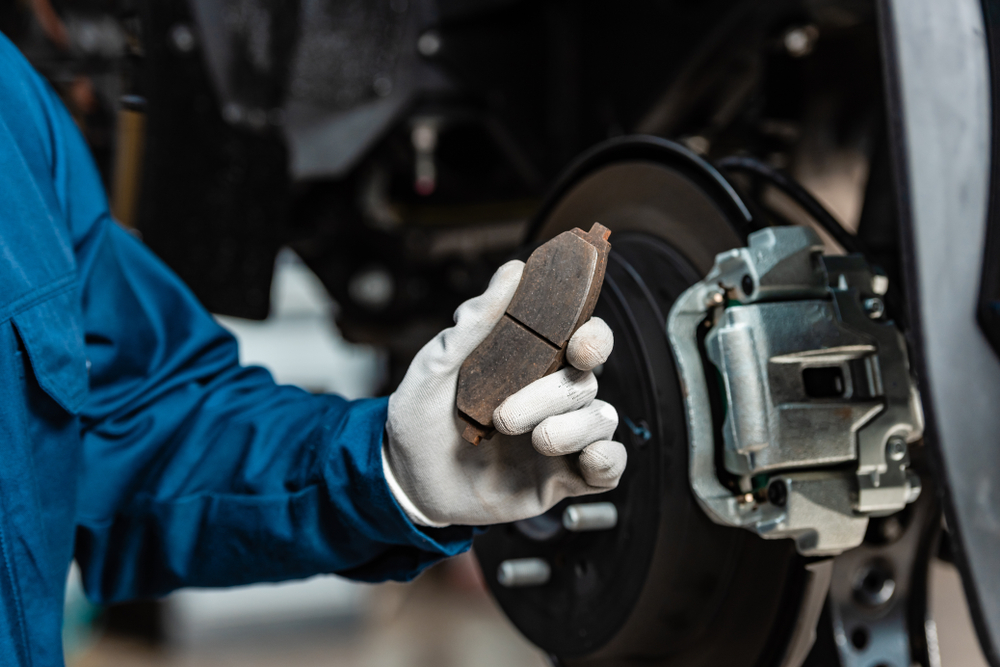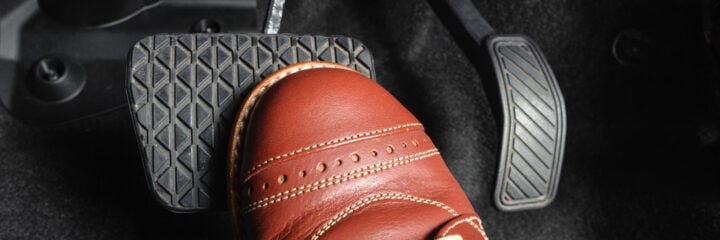Brake pads don’t last forever.
And since you don’t want to wind up careening down a hill with no way to stop, it’s a good idea to make sure your brake pads are working the way they should. But how long do brake pads last? How long should brake pads last? And how do you know you can still rely on them?
In this guide, we’ve covered it all, including some tell-tale signs that your brake pads might need replacing. We’ve also offered some helpful tips on how you can prolong your brake pads.
For everything you need to know about how long brake pads last, read on!
The Average Lifespan of Brake Pads
You should expect your brake pads to last around 40,000 miles on average. But this can vary massively—some brake pads wear away after 20,000 miles, while others wear away after around 70,000 miles or more.
Your brake pads wear away over time because (and this is probably no surprise to you) of the friction caused when you use your brakes to slow down or stop your car. The material on your brake pads makes contact with the rotor, which slows down. And because the rotor slows down, so too do the wheels.
Over time, this contact causes your brake pads to wear. But there are lots of things that affect how long your brake pads last. They include:
1) How You Drive
If you drive faster, you need to brake more suddenly. And if you brake suddenly, you’re applying more friction to your brake pads, causing more wear. Obviously, that doesn’t mean you should drive unnecessarily slowly, but avoiding speeding can also avoid unneeded brake pad wear.
2) The Terrain
If you’re always driving on hilly terrain, or in places where you often need to brake and change your speed, you’re using your brakes more often. And if you’re using your brakes more often… well, I’m sure you can work out the rest.
Similarly, if you live in an area with heavy traffic, you’re probably always stepping on that brake pedal. And again, that’s gonna cause more wear.
3) The Type of Brake Pads You Have
Different types of brake pads wear in different ways and at different speeds.
Obviously, you can’t do much about the ones you already have installed on your car, but if you want to extend the shelf life of your brake pads, make sure that when you come to replace them, you replace them with the hardiest ones you can find.
Here’s what you can probably expect according to the type of brake pads you have (but, again, these are only rough estimates):
- Ceramic pads: These are the hardiest and offer the most longevity. Ceramic brake pads usually last for around 70,000 miles
- Metallic pads: These usually last for around 50,000 miles
- Organic pads: These wear away the quickest and can range massively in durability according to which organic materials your brake pads are made of. But generally speaking, they’ll probably need replacing at around 30,000 miles or so.
It’s also important to note that front brake pads usually wear away before rear brake pads. When you apply your brakes, the front of your car has to take a bigger load of force—and because it takes a bigger load of force, the front brake pads take on a more significant amount of friction.
4) The Weight of Your Car
The heavier your car is, the more force it accumulates, and the more force and friction required to slow it down. If you’re always carrying lots of stuff in your car, you’re also using more force and friction when you apply your brakes. So you should try to reduce the weight of your car.
Don’t carry unnecessary stuff, remove any fittings that you’re not regularly using, and don’t let your partner or your kids in your car, ever (just joking, obviously).
5) How You Brake
Have you ever heard of engine braking? Engine braking is when you decrease your speed by easing off the accelerator and downshifting your gears, resulting in your car slowing without you even having to touch your brakes (well, unless you’re slowing to an absolute stop).
If you can learn to engine brake, you’ll be able to make your brake pads last way longer.
That said, if you drive an automatic, engine braking can damage your transmission system—so don’t do it.
Signs You Need to Replace Your Brake Pads

As you’ve probably noticed from above, it’s pretty hard to work out categorically when your brake pads are going to need replacing. There’s no magic number at which you’ll need to replace your brake pads, so the best thing to do is look out for signs that they might need replacing. Here are some good signs you need to replace your brake pads:
1) Your Car Doesn’t Brake Like It Used To
Yeah, this is the most obvious one.
If your car isn’t braking like it used to, or as it should, or in a way that just doesn’t feel right, you might need to get your brake pads replaced. And don’t delay—as soon as you think there might be a problem, address that problem. If you leave it too late, you might get yourself in trouble.
2) Squeals on the Wheels
If you regularly hear squealing, your brakes are too worn away, and you probably need to replace them. A little squeal once in a while (especially in wet weather or when braking suddenly) is okay, but not regular squealing.
This squealing is actually a safety feature—manufacturers install brake wear indicators, so you know when your brakes need changing.
3) Grinding
Squealing is bad, but grinding is way worse. If your car is grinding when you apply your brakes, your brakes are completely worn away, and your discs are making contact with your calipers. If you hear any grinding or screeching, you’re far from safe, and you shouldn’t be using your car at all. The moment you hear any grinding, you need to replace those brake pads.
4) Your Brake Pads Look Thin
Yep, if you’re in doubt, you can just look at your brake pads. Have a little look through the spokes of your wheels, and if your brake pads look less than ¼ of an inch thick, it’s probably time to change them.
5) Your Brake Pedal Is Vibrating
If your brake pedal is vibrating, your brake pads are probably worn (maybe even unevenly worn). If you’re experiencing unusual vibrations when you place your foot on your brake pedal, it’s time to get those brake pads checked out.
If you’re unsure about any of the above, and if you don’t know whether or not you might need to replace your brake pads, speak to an expert. This advice is no replacement for getting an expert to have a practical in-person look at your car.
If you’re certain you do need to replace your brake pads, make sure you replace them with some good ones.
It’s absolutely possible to replace your own brake pads, especially if you’re experienced in maintaining and fixing up your car. That said, if you’re in any doubt about how to replace your brake pads, get an expert to do it for you. Make sure the expert you choose is reputable and reliable and that they’re fully certified. You don’t want to risk having faulty brakes!
How to Prolong the Life of Your Brake Pads

If you want to prolong the life of your brake pads, consider the factors we’ve already mentioned in this article. But as a handy little reminder, here are a small few things you can do to extend the life of your brake pads:
- Drive slowly
- Brake less suddenly and less aggressively
- Use your car less!
- Strip away any excess weight from your car
- Try not to drive during periods of heavy traffic
- Engine brake if and when you can
- Replace your existing brake pads with ceramic ones
Final Words
There you have it—everything you need to know about how long brake pads last! Now you know how long they should last, how you can make them last longer, and the tell-tale signs of an impending need for replacement.
The main thing to take away is this—don’t worry so much about an arbitrary number. Instead, look out for the signs that your brake pads are wearing, and if they are, make sure you get them replaced right away.


